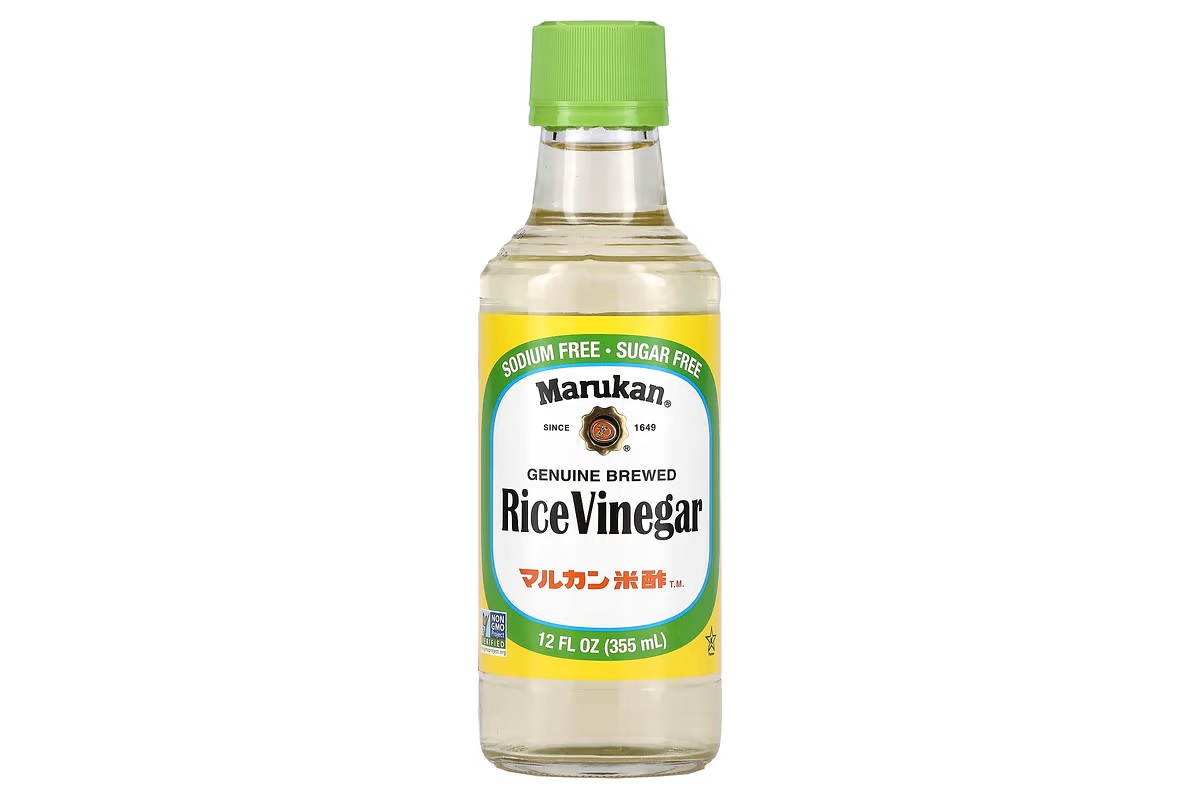
Rice vinegar is a popular ingredient in many cuisines around the world, known for its unique flavor and versatility in various dishes. Made from fermented rice, this vinegar has been used for centuries in Asian cooking and has gained popularity in Western cuisines as well. Not only does rice vinegar add a tangy and slightly sweet taste to dishes, but it also boasts numerous nutritional benefits. In this article, we will dive into 19 rice vinegar nutrition facts, shedding light on its calorie content, vitamins, minerals, and potential health benefits. Whether you’re a fan of Asian cuisine or simply looking to enhance the nutritional value of your meals, understanding the nutritional profile of rice vinegar is essential. So, let’s delve into these interesting facts about rice vinegar!
Key Takeaways:
- Rice vinegar is a low-calorie, fat-free, and gluten-free option that supports digestive health, weight loss, and heart health. It’s versatile and easy to incorporate into various dishes for added flavor.
- With essential vitamins, antioxidants, and anti-inflammatory properties, rice vinegar not only enhances the taste of your meals but also promotes skin health and may provide relief for a sore throat. It’s a natural and healthy addition to your diet.
Low in Calories
Rice vinegar is a great option for those looking to manage their calorie intake. With just 45 calories per 100 grams, it is a low-calorie alternative to other salad dressings and condiments.
Fat-Free
Rice vinegar is naturally fat-free, making it an excellent choice for those watching their fat intake. It adds flavor to dishes without adding any unwanted fats to your diet.
Low in Sodium
If you’re mindful of your sodium intake, rice vinegar is a good option. It is low in sodium, making it suitable for individuals who need to limit their sodium intake for health reasons.
Source of Essential Vitamins
Rice vinegar is a source of essential vitamins such as vitamin C and vitamin K. Vitamin C is important for immune function, while vitamin K plays a role in blood clotting and bone health.
Contains Antioxidants
Rice vinegar contains antioxidants that help protect the body against damage from harmful free radicals. Antioxidants can contribute to overall health and well-being.
Promotes Digestive Health
The acetic acid in rice vinegar can help promote healthy digestion by stimulating the production of digestive enzymes in the stomach. This can aid in the digestion of food and prevent digestive issues.
May Aid in Weight Loss
Due to its low-calorie content and fat-free nature, rice vinegar can be a helpful addition to a weight loss diet. It provides flavor without adding excessive calories or fats.
Helps Regulate Blood Sugar
Rice vinegar has been shown to have a positive impact on blood sugar levels. The acetic acid in rice vinegar can help improve insulin sensitivity and regulate glucose metabolism.
Supports Heart Health
The antioxidants and acetic acid found in rice vinegar may help support heart health by reducing inflammation, promoting healthy blood pressure levels, and improving cholesterol profiles.
Gluten-Free
Rice vinegar is naturally gluten-free, making it suitable for individuals with gluten sensitivities or those following a gluten-free diet.
Versatile Ingredient
Rice vinegar is a versatile ingredient that can be used in various dishes, including salad dressings, marinades, sauces, and pickled vegetables. Its mild and slightly sweet flavor complements a wide range of cuisines.
Preservative-Free
Rice vinegar is free of preservatives, additives, and artificial flavors, making it a more natural and healthier option compared to some commercially available condiments and dressings.
May Improve Skin Health
Some studies suggest that rice vinegar may have benefits for skin health. Its antioxidant properties and ability to regulate pH levels could contribute to healthier-looking skin.
May Have Anti-Inflammatory Effects
Rice vinegar contains compounds that have been shown to have anti-inflammatory effects. Incorporating it into your diet may help reduce inflammation in the body.
Suitable for Vegan and Vegetarian Diets
Rice vinegar is a vegan and vegetarian-friendly condiment that adds flavor to plant-based meals. It is free from animal products and can be enjoyed by those following these dietary lifestyles.
Aids in Food Preservation
Rice vinegar has been traditionally used as a natural food preservative due to its antimicrobial properties. It can help extend the shelf life of certain perishable foods.
May Help Alleviate Sore Throat
Gargling diluted rice vinegar may provide temporary relief for a sore throat. The acidity of the vinegar can help soothe irritation and reduce discomfort.
Can Enhance Flavor and Tenderize Meat
Rice vinegar can be used as a marinade or added to meat dishes to enhance flavor and help tenderize tough cuts of meat. It adds a tangy and slightly sweet taste that complements various types of meat.
Easy to Incorporate into Your Diet
Adding rice vinegar to your diet is simple. You can use it as a salad dressing, mix it into sauces and marinades, or use it as a flavor enhancer in your favorite recipes.
Conclusion
In conclusion, rice vinegar is not only a delicious and versatile condiment, but it also offers numerous health benefits. From aiding digestion to boosting the immune system, rice vinegar is a great addition to any diet. Its low calorie and fat content make it a suitable choice for those watching their weight, while its rich nutrient profile provides essential vitamins and minerals.Remember to choose organic, unfiltered rice vinegar to reap the most nutritional benefits. Whether used in dressings, marinades, or even as a natural cleaning solution, rice vinegar can enhance the flavor of your meals while promoting overall well-being.
FAQs
1. Is rice vinegar gluten-free?
Yes, rice vinegar is naturally gluten-free. However, it is important to check the label of commercially prepared rice vinegar to ensure it hasn’t been cross-contaminated with gluten-containing ingredients.
2. Can rice vinegar help with weight loss?
While rice vinegar itself doesn’t directly cause weight loss, it can be a beneficial addition to a weight loss diet. Its low calorie and fat content make it a healthier alternative to high-calorie dressings or sauces.
3. How should I store rice vinegar?
Rice vinegar should be stored in a cool, dark place, away from direct sunlight and heat. After opening, it is best to refrigerate it to maintain its quality and extend its shelf life.
4. Can rice vinegar be used in recipes other than Asian dishes?
Absolutely! While rice vinegar is commonly used in Asian cuisine, its mild and slightly sweet flavor can complement a variety of dishes, including salads, stir-fries, and marinades.
5. Is there any difference between rice vinegar and rice wine vinegar?
Rice vinegar and rice wine vinegar are often used interchangeably. Both are made from fermented rice, but rice vinegar typically has a milder flavor compared to rice wine vinegar.
Was this page helpful?
Our commitment to delivering trustworthy and engaging content is at the heart of what we do. Each fact on our site is contributed by real users like you, bringing a wealth of diverse insights and information. To ensure the highest standards of accuracy and reliability, our dedicated editors meticulously review each submission. This process guarantees that the facts we share are not only fascinating but also credible. Trust in our commitment to quality and authenticity as you explore and learn with us.


